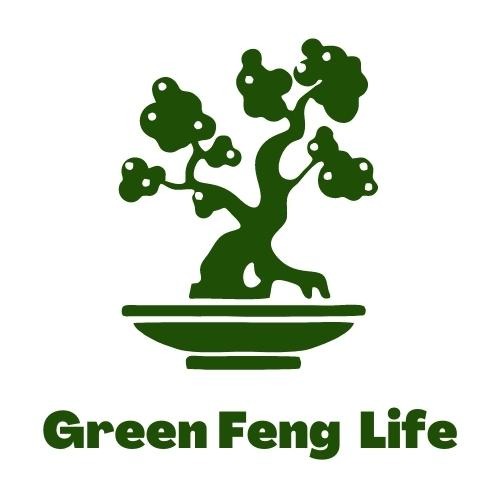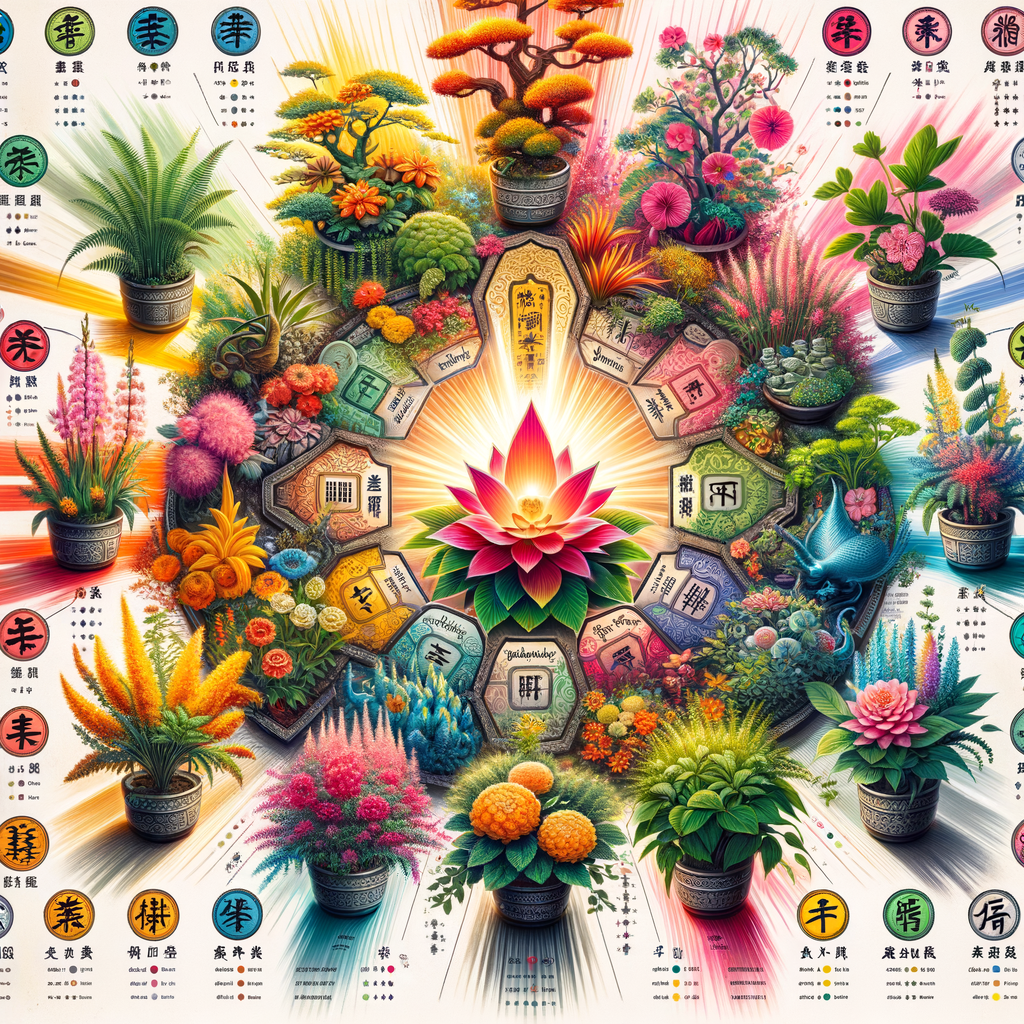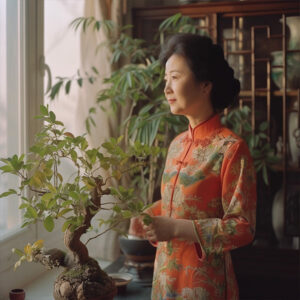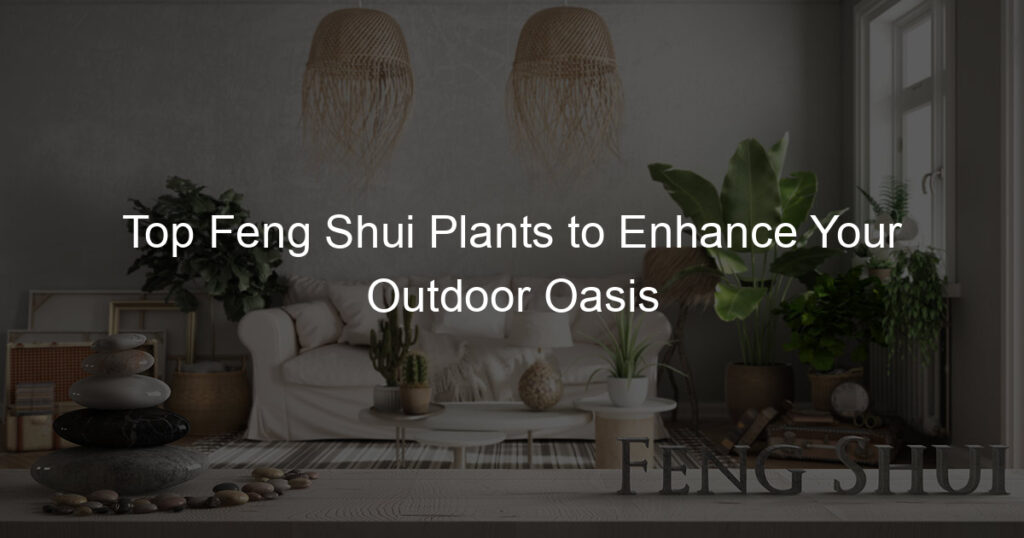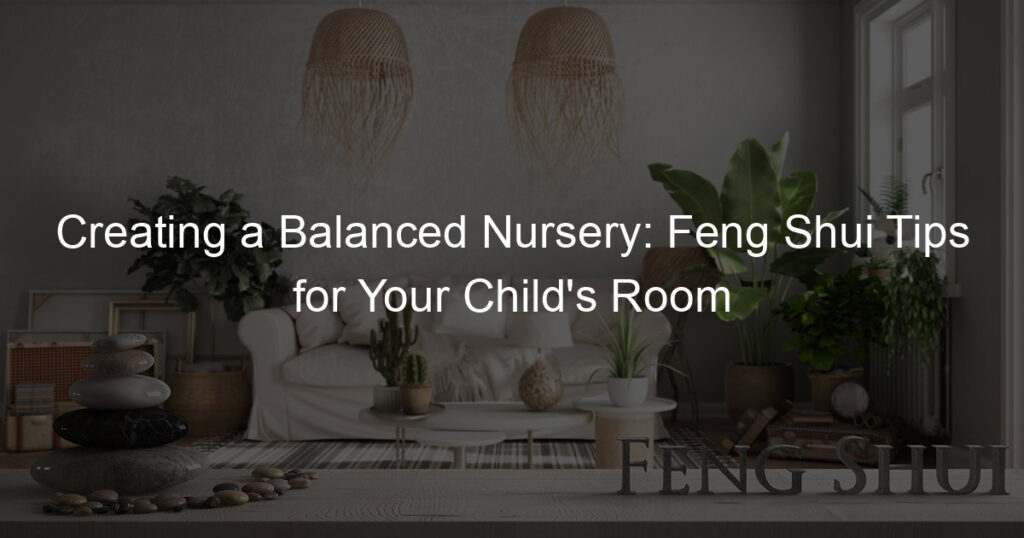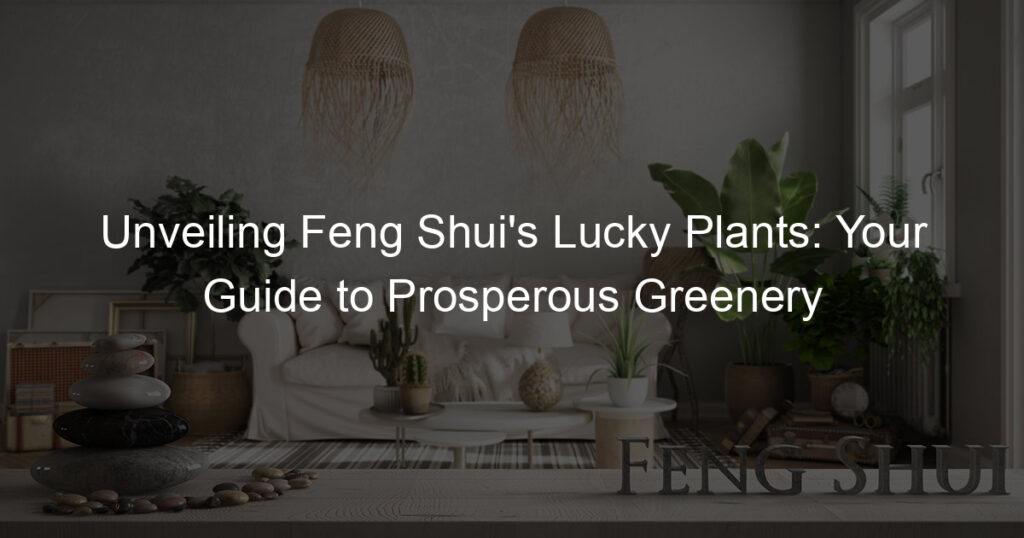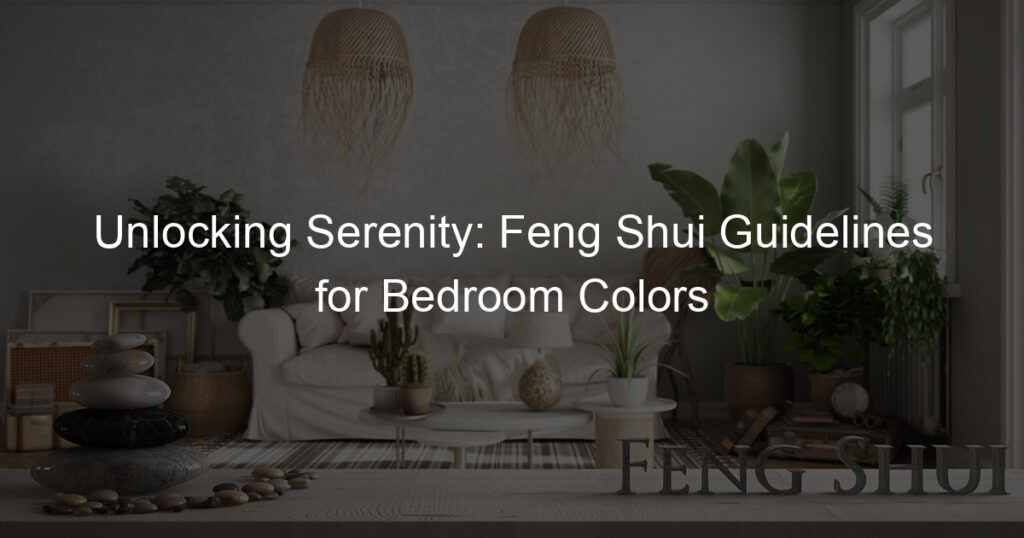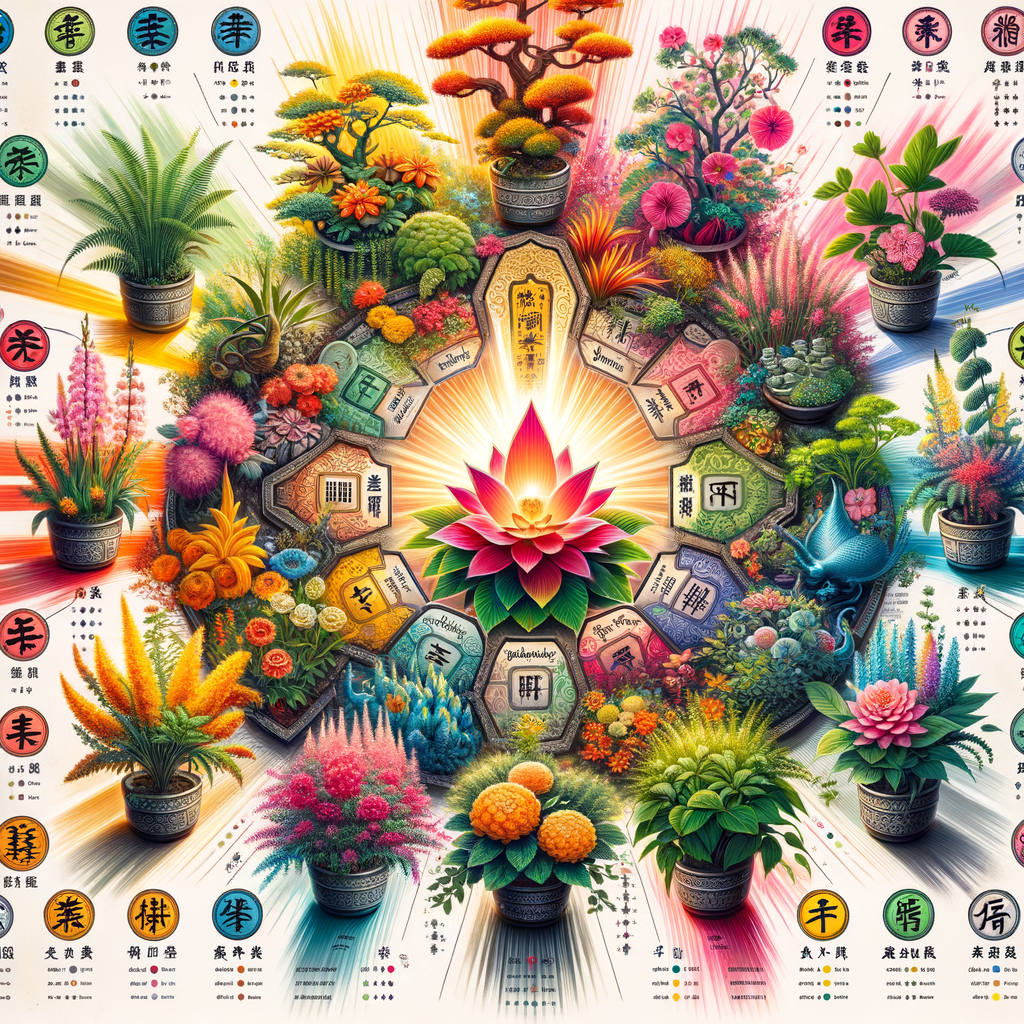
Introduction to Fengshui Plants
Welcome to the fascinating world of Fengshui plants. This introductory guide will help you understand the concept of Fengshui, the importance of plants in Fengshui, and how these plants can bring harmony and balance to your space.
- Understanding the concept of Fengshui
- The importance of plants in Fengshui
- How Fengshui plants can bring harmony and balance
Fengshui, a traditional Chinese practice, is all about creating a sense of balance and harmony in our surroundings. It’s based on the belief that our environment can influence our well-being and success. The term Fengshui translates to “wind” (Feng) and “water” (Shui), symbolizing the flow of life that one should aspire to have in their living or working space.
In Fengshui, plants play a crucial role. They are considered living, breathing organisms that embody life energy, also known as ‘Chi’. Plants can help channel this energy in a positive manner, creating a sense of peace and prosperity. They are also known to purify the air, contributing to a healthier living environment.
Fengshui plants can bring harmony and balance in two significant ways. Firstly, they can help balance the five elements of Fengshui – Wood, Fire, Earth, Metal, and Water. For example, a plant with red flowers can represent both the Wood (plant) and Fire (red color) elements. Secondly, the placement of these plants in specific areas, according to the Bagua, or Fengshui energy map, can help attract positive energy and deflect negative energy, thereby promoting harmony and balance.
In the following sections, we will delve deeper into the types of plants considered auspicious in Fengshui, their benefits, the symbolism associated with them, and how to select and place them for maximum effect. So, stay tuned to learn how to create a harmonious environment with the help of Fengshui plants.
Auspicious Plants for Fengshui
Fengshui, a traditional Chinese practice, emphasizes the importance of harmonizing our surroundings. One key aspect of this is the use of auspicious plants. These plants are believed to bring good luck, prosperity, and positive energy into our homes and offices. Let’s explore some of the best Fengshui plants.
Best Fengshui Plants
-
The Lucky Bamboo
The Lucky Bamboo, scientifically known as Dracaena Sanderiana, is one of the most popular Fengshui plants. It’s not just its vibrant green color that makes it a favorite. The number of stalks it has also holds significance. For instance, three stalks represent happiness, wealth, and long life. It’s easy to care for and can grow in both water and soil.
-
The Jade Plant
Next on our list is the Jade Plant, also known as Crassula Ovata. This succulent plant with its small pink or white flowers is a symbol of prosperity. The round, plump leaves that resemble jade coins have given it the nickname “money plant.” It’s believed to attract wealth and success, especially when placed near the entrance of homes or businesses.
-
The Money Tree
Lastly, we have the Money Tree, or Pachira Aquatica. This plant is often braided together to lock in luck and prosperity. It’s said that the five leaves on each stem represent the five fundamental Fengshui elements: wood, fire, earth, metal, and water. This balance of elements is believed to bring a harmonious flow of positive energy.
These are just a few examples of the best Fengshui plants. Each one carries a unique symbolism and can help create a more balanced and positive environment. Remember, the placement of these plants in your space is also crucial in Fengshui. So, choose your plants wisely and place them in a way that best supports your personal energy and the energy of your space.
Fengshui Indoor Plants
Indoor plants are not just about aesthetics; they also play a significant role in Fengshui. Here are three popular Fengshui indoor plants that can help harmonize your home’s energy.
-
Peace Lily
The Peace Lily, known for its beautiful white flowers, is a popular Fengshui plant. It is believed to bring tranquility and peace to your home. According to Fengshui principles, Peace Lilies can help balance a room’s energy, making it feel more inviting and comfortable. They are also known to purify the air, removing toxins and improving indoor air quality.
-
Rubber Plant
The Rubber Plant, with its large, glossy leaves, is another excellent choice for Fengshui. It symbolizes wealth, abundance, and good luck. The Rubber Plant is also known for its ability to purify the air, removing toxins and creating a healthier living environment. It’s a hardy plant that requires minimal care, making it a great choice for beginners.
-
Spider Plant
The Spider Plant is a popular Fengshui plant known for its air-purifying qualities. This plant is believed to bring happiness and prosperity to the home. It’s also very easy to care for, making it a great choice for those new to indoor gardening. The Spider Plant’s long, arching leaves can help soften the energy in a room, creating a more relaxed and peaceful atmosphere.
These plants not only enhance the beauty of your home but also help create a positive and harmonious environment. Remember, the key to Fengshui is balance, and these plants can help achieve that balance in your home.
Fengshui Plant Benefits
When it comes to enhancing the ambiance of your living space, Fengshui plants are a top choice. They are not just visually appealing, but also bring along a host of benefits. Let’s delve into some of these advantages.
- Improving Air Quality
- Boosting Mood and Productivity
- Attracting Positive Energy
One of the most significant benefits of Fengshui plants is their ability to improve air quality. Plants are nature’s air purifiers. They absorb harmful toxins from the air and release oxygen, making the air cleaner and healthier to breathe. A study by NASA found that certain houseplants can remove up to 87% of air toxins in 24 hours. Imagine the difference a Fengshui plant could make in your home or office!
Having a Fengshui plant in your space can also boost your mood and productivity. According to a study by the University of Exeter, plants can increase well-being by 47%, increase creativity by 45%, and boost productivity by 38%. The vibrant green color of these plants can help reduce stress and create a calming environment, which can enhance your mood and make you more productive.
Fengshui plants are believed to attract positive energy or ‘Chi’ into your space. According to Fengshui principles, the presence of these plants can balance the energy in your home or office, promoting harmony and peace. They can also ward off negative energy, creating a positive and uplifting environment.
In conclusion, Fengshui plants are more than just decorative elements. They can improve air quality, boost mood and productivity, and attract positive energy. So, why not consider adding a Fengshui plant to your space and experience these benefits for yourself?
Fengshui and Plant Placement
Plant placement in your home is not just about aesthetics. It’s also about creating a harmonious and positive environment. Fengshui, an ancient Chinese practice, can guide us in placing plants in our homes to promote good energy flow and balance.
Fengshui Plant Guide
Here is a simple guide to help you understand how to use Fengshui principles when placing plants in your home:
- Choosing the right location for your plants
- Understanding the Bagua map
- Plants for specific areas of your home
According to Fengshui, plants represent the wood element and are best placed in the east, southeast, and south areas of your home. These areas are associated with health, wealth, and fame respectively. However, avoid placing plants in the bedroom as they can disrupt sleep.
The Bagua map is a fundamental tool in Fengshui. It divides your home into nine areas, each representing a different life aspect. By placing plants in the right areas, you can enhance the energy flow and bring positive changes to your life. For example, placing a plant in the wealth area (southeast) can attract prosperity.
Different plants have different Fengshui properties. For instance, the Lucky Bamboo is believed to bring luck and prosperity, making it a good choice for the wealth area. The Peace Lily, on the other hand, purifies the air and brings peace and harmony, making it suitable for the family area (east).
Remember, Fengshui is all about balance and harmony. So, when placing plants, consider their size, color, and shape to ensure they complement the surrounding environment and don’t overpower it.
| Plant | Fengshui Property | Best Area |
|---|---|---|
| Lucky Bamboo | Brings luck and prosperity | Wealth area (Southeast) |
| Peace Lily | Purifies air, brings peace and harmony | Family area (East) |
By following these simple Fengshui principles, you can transform your home into a space that not only looks good but also feels good!
Fengshui Plant Selection
Choosing the right plants for your space is a crucial part of Fengshui. The type of plant you select can greatly influence the energy flow and overall harmony in your home or office. Here are some key factors to consider when selecting Fengshui plants:
- Choosing plants based on their symbolism
- Considering the size and shape of the plant
- Choosing plants that are healthy and vibrant
In Fengshui, different plants symbolize different energies. For example, the Lucky Bamboo plant represents good luck and prosperity, while the Peace Lily symbolizes tranquility and purity. It’s important to understand the symbolism of each plant to ensure it aligns with the energy you want to attract in your space.
The size and shape of your plant also play a significant role in Fengshui. Larger plants can absorb more negative energy, making them ideal for larger spaces or areas with high traffic. On the other hand, smaller plants are perfect for promoting positive energy in smaller spaces. The shape of the plant’s leaves is also important. Round leaves are considered more harmonious, while pointed leaves can create a more aggressive energy.
The health and vibrancy of your plant are crucial in Fengshui. A healthy, vibrant plant is believed to attract positive energy, while a sickly or dying plant can attract negative energy. Therefore, it’s essential to choose plants that are in good health and well taken care of. Regular watering, adequate sunlight, and proper nutrition are all key factors in maintaining the health and vibrancy of your plants.
In conclusion, the selection of Fengshui plants involves careful consideration of their symbolism, size, shape, and health. By choosing the right plants, you can greatly enhance the positive energy and overall harmony in your space.
Fengshui Plant Symbolism
Fengshui, an ancient Chinese practice, uses energy forces to harmonize individuals with their surrounding environment. One of the ways to achieve this harmony is through the use of plants. Each plant in Fengshui carries a unique symbolism that can bring different energies into your home or office. Let’s explore the symbolism of the most auspicious Fengshui plants.
Most Auspicious Fengshui Plant
- Symbolism of the Lucky Bamboo
- Symbolism of the Jade Plant
- Symbolism of the Money Tree
The Lucky Bamboo, scientifically known as Dracaena Sanderiana, is one of the most popular Fengshui plants. It symbolizes good luck and prosperity. The number of stalks on the plant also holds significance. For instance, two stalks represent love, three stalks symbolize happiness, wealth and long life, while five stalks are for wealth. This plant is a perfect gift for businesses or homes, as it is believed to bring fortune and success.
The Jade Plant, or Crassula Ovata, is another auspicious plant in Fengshui. It is often referred to as the ‘money plant’ because its round, green leaves resemble coins, symbolizing wealth and prosperity. This plant is often placed near the entrance of homes or businesses to attract financial success. It is also believed to promote positive mental health by reducing negative energy.
The Money Tree, known scientifically as Pachira Aquatica, is a plant that is believed to attract money and luck. The braided trunk of the Money Tree symbolizes the interweaving of fate, while its five leaves on each branch represent the five elements of Fengshui: wood, water, earth, fire, and metal. This plant is often placed in the wealth corner of the home or office to enhance financial luck.
In conclusion, Fengshui plants are not just about enhancing the aesthetic appeal of your space. They carry deep symbolism and are believed to attract positive energy, prosperity, and luck. Incorporating these plants into your home or office can create a more harmonious and prosperous environment.
Conclusion: Creating Harmony with Fengshui Plants
In this article, we’ve explored the fascinating world of Fengshui plants and their role in creating a harmonious environment. Let’s recap the key points and takeaways.
- Recap of the Importance of Fengshui Plants
- Key Takeaways for Selecting and Placing Your Plants
- Final Thoughts on Achieving Fengshui Harmony with Plants
Fengshui plants are more than just decorative elements. They are powerful tools that can help balance the energy in our homes and offices. They can bring prosperity, good health, and positive energy. The right plant in the right place can make a significant difference in the Fengshui of your space.
Choosing the right Fengshui plant requires understanding its symbolism and energy. For example, the Lucky Bamboo symbolizes good luck and prosperity, while the Jade Plant is known for attracting wealth. Placement is also crucial. The east sector of your home is ideal for health-related plants, while the southeast attracts wealth and abundance.
Creating harmony with Fengshui plants is a journey, not a destination. It’s about understanding the energy flow in your space and using plants to enhance and balance that energy. Remember, the goal is not perfection, but harmony and balance. With the right plants in the right places, you can create a space that nurtures and supports you.
As the ancient Chinese proverb says, “If you want to be happy for a lifetime, become a gardener.” So, start your Fengshui plant journey today and create a harmonious environment that brings you joy, peace, and prosperity.
